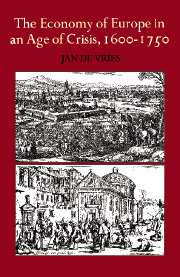Book contents
- Frontmatter
- Contents
- List of Illustrations
- Dedication
- Preface
- 1 The age of crisis
- 2 The agrarian economies on divergent paths
- 3 Restructuring industry
- 4 The dynamism of trade
- 5 Urbanization and regional trade
- 6 Capitalism creating its own demand
- 7 Capital accumulation and the bourgeoisie
- 8 Mercantilism, absolutism, and economic growth
- Notes
- Index
5 - Urbanization and regional trade
Published online by Cambridge University Press: 28 May 2018
- Frontmatter
- Contents
- List of Illustrations
- Dedication
- Preface
- 1 The age of crisis
- 2 The agrarian economies on divergent paths
- 3 Restructuring industry
- 4 The dynamism of trade
- 5 Urbanization and regional trade
- 6 Capitalism creating its own demand
- 7 Capital accumulation and the bourgeoisie
- 8 Mercantilism, absolutism, and economic growth
- Notes
- Index
Summary
Units of economic life
The historian must take care to avoid having the availability of documents dictate what is and is not important in the economic life of the past. Governments that did little else invariably tried to control and tax the import and export of goods. As a consequence customs records are available from quite early dates to illuminate the major trends of international trade. Likewise, European trade links with other continents are well-documented thanks to the privileged monopolies that were erected everywhere to defend national interests and enrich royal coffers. In contrast, the hundreds of thousands of Europeans who labored to provision local markets dealing in the mundane necessities of everyday life were not often the object of systematic record keeping. Consequently, their role in the European economy is easy to ignore, or more seriously, to dismiss as inconsequential – as an inert process of repetitive transactions incapable of injecting dynamic change in the economy.
The altered character of agriculture, industry, and government described in this volume supports the hypothesis that regional trade evolved in scope and organization during the seventeenth century. If it continued to lack the drama of international trade, it no longer lacked its dynamism. Indeed, it is not impossible that the explosive growth of the East and West Indies trades will ultimately be explained as a consequence of a revitalization of the hundreds of regional trading economies into which Europe was organized in early modern times.
- Type
- Chapter
- Information
- The Economy of Europe in an Age of Crisis, 1600–1750 , pp. 147 - 175Publisher: Cambridge University PressPrint publication year: 1976



